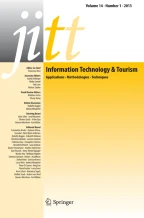Abstract
Virtual tourism and authenticity are concepts amply discussed by tourism scholars. Yet, limited empirical studies have explored perceptions of authenticity of virtual tourism. This paper attempts to fill this gap existing in the body of knowledge as it provides an insight into perceptions of virtual tourism and authenticity. Driven by an interpretivist paradigm, twenty in-depth, online interviews were conducted with a group of tourism students studying in a Malaysian private university. The findings show that while virtual tourism was not perceived as totally inauthentic, the participants conceived corporeal and sensorial involvements as crucial components to experience authenticity in tourism settings.
Similar content being viewed by others
References
Bamberger M (ed) (2000) Integrating quantitative and qualitative research in development projects. World Bank Publications, Washington, DC
Bell MW (2008) Toward a definition of “Virtual Worlds”. J Virtual Worlds Res 1(1):1–5
Bittarello MB (2008) Another time, another space: virtual worlds, myths and imagination. J Virtual Worlds Res 1(1):1–18
Boorstin OJ (1964) The image: a guide to pseudo-events in America. Harper and Row, New York
Braun V, Clarke V (2006) Using thematic analysis in psychology. Qual Res Psychol 3(2):77–101. doi:10.1191/1478088706qp063oa
Buhalis D (2003) eTourism: information technology for strategic tourism management. Financial Times Prentice Hall, New York
Burdea GC, Coiffet P (2003) Virtual reality technology, 2nd edn. Wiley-Interscience, Hoboken
Calvino I (1972) Invisible cities. Harcourt Brace & Company, Orlando
Cheong R (1995) The virtual threat to travel and tourism. Tour Manag 16(6):417–422
Clark E, McCann TV (2005) Researching students: an ethical dilemma. Nurse Res 12(3):42–51. doi:10.7748/nr2005.01.12.3.42.c5947
Cohen E (1988) Traditions in the qualitative sociology of tourism. Ann Tour Res 15(1):29–46. doi:10.1016/0160-7383(88)90069-2
Dewailly J (1999) Sustainable tourist space: from reality to virtual reality? Tour Geogr 1(1):41–55. doi:10.1080/14616689908721293
Eco U (1986) Travels in hyper reality: essays. Houghton Mifflin Harcourt, New York
Floridi L (2007) A look into the future impact of ICT on our lives. Inf Soc 23(1):59–64. doi:10.1080/01972240601059094
Gutiérrez M, Vexo F, Thalmann D (2008) Stepping into virtual reality. Springer, London
Guttentag DA (2010) Virtual reality: applications and implications for tourism. Tour Manag 31(5):637–651. doi:10.1016/j.tourman.2009.07.003
Hobson JP, Williams A (1995) Virtual reality: a new horizon for the tourism industry. J Vacat Mark 1(2):124–135. doi:10.1177/135676679500100202
Jennings G (2010) Tourism research, 2nd edn. John Wiley & Sons Australia Ltd, Milton
Levin J, Scannapieco E, Silk J (1998) Is the universe infinite or is it just really big? Phys Rev D 58(10):103516. doi:10.1103/PhysRevD.58.103516
Lewis BC (1996) Islam and Ivoirien Citizenship in ‘Apres - Houphouét’. In: Cote d’Ivoire. Unpublished paper for the annual meeting of the African Studies Association, San Francisco, November
Lofland J, Lofland L (1994) Analyzing social settings: a guide to qualitative observation and analysis. Wandsworth, London
MacCannell D (1976) The tourist: a new theory of the leisure class. MacMillan Press Ltd, London
Markham AN (2005) The methods, politics, and ethics of representation in online ethnography. In: Denzin NK, Lincoln YS (eds) The sage handbook of qualitative research. Sage, Thousand Oaks, pp 247–284
McKercher B (1993) Some fundamental truths about tourism: understanding tourism’s social and environmental impacts. J Sustain Tour 1(1):6–16
Mitchell J (2011) Second life makes $100M a year in revenue. http://readwrite.com/2011/08/08/second_life_makes_100m_a_year_in_revenue. Accessed 5 Feb 2016
Mura P, Lovelock B (2009) A not so little Italy? Tourist and resident perceptions of authenticity in Leichhardt, Sydney. Tour Cult Commun 9(1):29–48. doi:10.3727/109830409787556620
Nielsen Company (2015) The future of grocery—e-commerce, digital technology and changing shopping preferences around the world. http://www.nielsen.com/content/dam/nielsenglobal/vn/docs/Reports/2015/Nielsen%20Global%20E-Commerce%20and%20The%20New%20Retail%20Report%20APRIL%202015%20(Digital).pdf
Nuryanti W (1996) Heritage and postmodern tourism. Ann Tour Res 23(2):249–260
Pearce DG, Moscardo G (1986) The concept of authenticity in tourist experiences. J Sociol 22(1):121–132
Rao V, Woolcock M (2004) Integrating qualitative and quantitative approaches in program evaluation. In: Bourguignon F, Pereira da Silva L (eds) The impact of economic policies on poverty and income distribution: evaluation techniques and tools. Oxford University Press (for World Bank), Oxford, pp 165–190
Shapka JD, Domene JF, Khan S, Yang LM (2016) Online versus in-person interviews with adolescents: an exploration of data equivalence. Comput Hum Behav 58:361–367
Tavakoli R, Mura P (2015) “Journeys in Second Life”—Iranian Muslim women’s behaviour in virtual tourist destinations. Tour Manag 46:398–407. doi:10.1016/j.tourman.2014.07.015
Tucker H (2009) Recognizing emotion and its postcolonial potentialities: discomfort and shame in a tourism encounter in Turkey. Tour Geogr 11(4):444–461. doi:10.1080/14616680903262612
Urry J (1990) The tourist gaze. Sage, London
Veijola S, Jokinen E (1994) The body in tourism. Theory Cult Soc 11:125–151
Vince J (2004) Introduction to virtual reality. Springer, New York
Wang N (1999) Rethinking authenticity in tourism experience. Ann Tour Res 26(2):349–370
Wang Y (2007) Customized authenticity begins at home. Ann Tour Res 34(3):789–804. doi:10.1016/j.annals.2007.03.008
Ward G (2000) Cities of God. Routledge, London
Wertheim M (1999) The pearly gates of cyberspace. A history of space from Dante to the internet. Virago Press, London
Williams A, Hobson JP (1995) Virtual reality and tourism: fact or fantasy? Tour Manag 16(6):423–427. doi:10.1016/0261-5177(95)00050-X
Author information
Authors and Affiliations
Corresponding author
Rights and permissions
About this article
Cite this article
Mura, P., Tavakoli, R. & Pahlevan Sharif, S. ‘Authentic but not too much’: exploring perceptions of authenticity of virtual tourism. Inf Technol Tourism 17, 145–159 (2017). https://doi.org/10.1007/s40558-016-0059-y
Received:
Revised:
Accepted:
Published:
Issue Date:
DOI: https://doi.org/10.1007/s40558-016-0059-y
